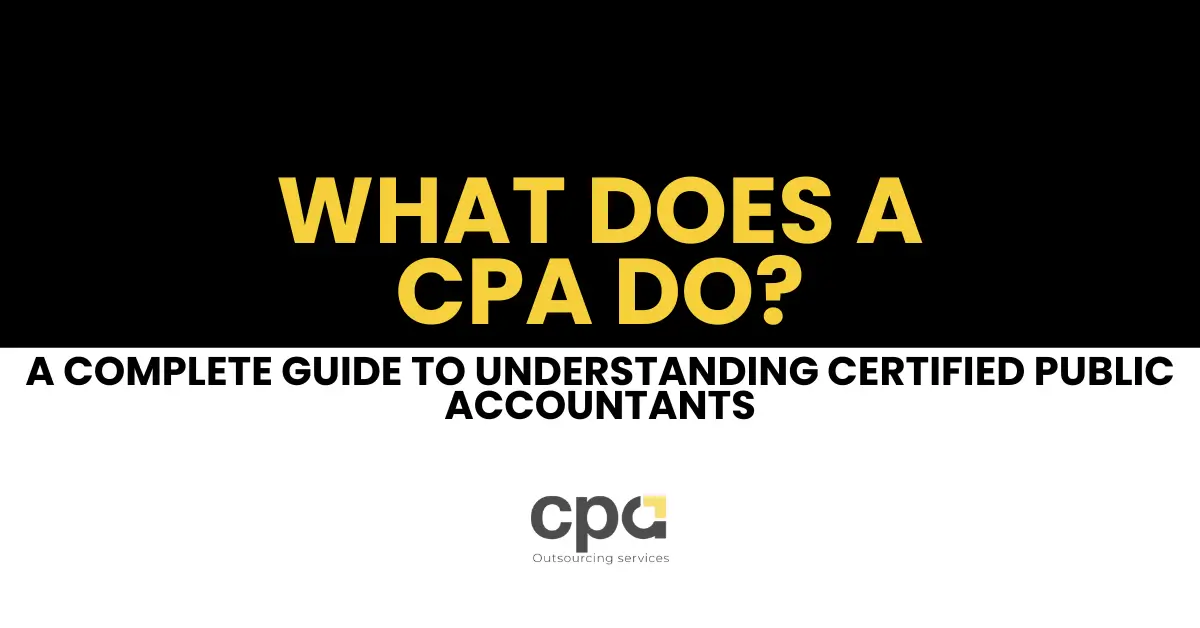What Does a CPA Do? A Complete Guide to Understanding Certified Public Accountants

When it comes to managing finances—whether personal, business, or corporate—many people eventually ask: What does a CPA do? The role of a CPA (Certified Public Accountant) goes far beyond crunching numbers. These licensed professionals carry a unique combination of analytical expertise, ethical standards, and financial knowledge that sets them apart in the accounting world.
In this guide, we’ll break down exactly what a CPA is, what they do, and why they play such an essential role in both individual and business financial health. Whether you’re considering hiring one or pursuing the credential yourself, understanding the scope of their responsibilities can help you make informed decisions.
What Is a Certified Public Accountant (CPA)?
A Certified Public Accountant (CPA) is a licensed accounting professional who has met rigorous education and experience requirements, passed the challenging CPA exam, and adheres to strict ethical standards. Each CPA is licensed by their state’s board of accountancy, which ensures they maintain ongoing professional development and uphold the highest quality in their work. This licensing distinguishes CPAs from regular accountants, giving them the authority to perform specialized services such as auditing and representing clients before the IRS.
Core Responsibilities: What Does a CPA Do?
CPAs wear many hats in the world of finance. Their expertise covers a broad range of duties, including:
- Tax Preparation and Planning: CPAs prepare and file tax returns while strategizing to minimize tax liabilities.
- Financial Auditing: They conduct thorough examinations of financial statements to ensure accuracy and compliance.
- Business Consulting: CPAs provide valuable advice on business operations, growth strategies, and financial management.
- Bookkeeping: Maintaining accurate financial records is a fundamental service offered by CPAs.
- Financial Reporting: They prepare detailed reports that help businesses and individuals understand their financial health.
- Forensic Accounting (Optional): Some CPAs specialize in investigating financial fraud and disputes.
Types of Services Provided by CPAs
CPAs offer a variety of services tailored to meet diverse financial needs:
- Tax Filing: Accurate and timely filing of individual and business tax returns.
- Financial Advisory: Helping clients make informed investment and financial planning decisions.
- Audit Services: Conducting independent audits for compliance and credibility.
- Consulting: Offering expert guidance on mergers, acquisitions, and business restructuring.
Why Should You Hire a CPA?
Hiring a CPA offers several advantages over working with a regular accountant. CPAs bring specialized knowledge, legal authority, and ethical standards that are especially valuable during tax season, business audits, or complex financial planning. Their expertise can help you avoid costly mistakes, optimize tax savings, and ensure compliance with ever-changing regulations.
How Do You Become a CPA?
Becoming a CPA involves a structured path:
- Educational Requirements: Typically, a bachelor’s degree in accounting or related field.
- Certification Process: Meeting state-specific experience requirements.
- Passing the CPA Exam: A comprehensive exam covering auditing, financial accounting, regulation, and business environment topics.
CPA vs. Accountant: What’s the Difference?
While all CPAs are accountants, not all accountants are CPAs. The key differences lie in licensing, expertise, and legal authority. CPAs have passed a rigorous exam, are licensed by the state, and can perform specialized services such as audits and representing clients before tax authorities. Regular accountants may handle bookkeeping and basic financial tasks but lack the credentials and authority of a CPA.
Final Thoughts on What a CPA Does
CPAs are indispensable allies in the financial world, offering expertise that spans tax preparation, auditing, consulting, and more. Their rigorous training and licensing ensure that they provide trustworthy, high-quality services that help individuals and businesses thrive financially.
If you’re looking for personalized assistance with your finances, taxes, or audits, consider reaching out to a local CPA today. Their professional guidance can make all the difference in achieving your financial goals.
Frequently Asked Questions
Why do I need a CPA?
A CPA can help with complex tax filings, financial planning, audits, and business consulting. Their expertise ensures you’re following tax laws, minimizing liabilities, and making smart financial decisions.
What is the role of a CPA?
A CPA (Certified Public Accountant) provides expert financial services, including tax preparation, auditing, financial planning, and business consulting. They help individuals and businesses manage their finances, ensure tax compliance, and improve financial performance.
What services does a CPA offer?
CPAs offer a variety of services such as tax filing, financial auditing, tax planning, consulting for businesses, forensic accounting, and advising on financial strategies for individuals and corporations.
What is the difference between a CPA and an accountant?
While both CPAs and accountants handle financial records, CPAs are licensed professionals who have passed a rigorous exam and meet ongoing education requirements. They have more authority, especially for audits and tax filings.
What are the benefits of hiring a CPA for a small business?
A CPA can help small businesses with tax planning, financial forecasting, bookkeeping, and preparing for audits. They ensure the business complies with tax laws and optimizes financial strategies for growth.
What’s the difference between a CPA and a tax preparer?
A CPA is a licensed professional with advanced training and certification. Tax preparers, on the other hand, may only have basic tax knowledge and are not legally required to have any specific certification.
Can a CPA help with business taxes?
Yes, CPAs specialize in business tax preparation and planning, helping businesses maximize deductions, stay compliant with tax laws, and reduce overall tax liability.
Is a CPA required for tax filing?
While not required, hiring a CPA can be beneficial for complex tax situations. CPAs ensure accurate filing, offer tax-saving strategies, and handle potential audits.
